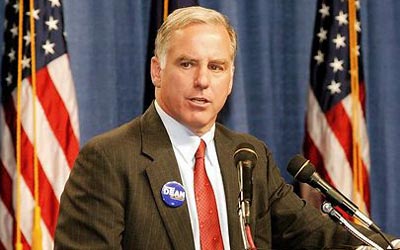Democratic presidential candidates and space: a primerby Jeff Foust
|
| Few voters will base their decision primarily or even secondarily on a candidate’s stand on space policy. |
Regardless, though, some people are curious about where the candidates stand on key space issues. Because most candidates have issued few statements on space issues, The Space Review contacted the campaigns of the nine major Democratic candidates—Wesley Clark, Howard Dean, John Edwards, Dick Gephardt, John Kerry, Dennis Kucinich, Joe Lieberman, Carol Moseley-Braun, and Al Sharpton—to directly solicit their opinions. In early December we sent a letter to each campaign, asking them these four questions:
- Have you been satisfied with NASA’s response to the Columbia accident and resulting investigation? If president, would you make any major changes to the shuttle or International Space Station programs?
- NASA’s current budget is about $15 billion a year. Do you believe this funding is adequate? If not, how much more (or less) money should NASA receive?
- There has been considerable discussion about the need for a new “vision” for the space program, one that could include resuming human missions to the Moon or a manned expedition to Mars. What vision do you have for NASA and space exploration in general?
- Are there any other major space policy initiatives—civil, military, or commercial—that you foresee your administration pursuing?
We followed up this letter at the beginning of last week with an email message with the same question to the campaigns. The results, while disappointing, were not entirely unexpected: only the Kucinich campaign responded to the original letter, and only the Kerry campaign replied to the followup email. We’ve tried to fill in the gaps by looking at statements that the candidates have made in the press, often in passing, on space issues. In the last several days a number of candidates who did not respond to our survey did make statements in response to reports that President Bush will announce a bold new space initiative—likely including human missions to the Moon and perhaps Mars—this coming Wednesday.
Dean: on to Mars… maybe
Howard Dean, the former governor of Vermont, has emerged in the last several months as one of, if not the, frontrunner for the Democratic nomination, thanks to a grassroots effort that propelled from relative obscurity compared to other, more established candidates. As a governor of a small state, Dean has no track record on major national issues, like defense, let alone smaller issues like space exploration. Dean’s campaign has also not issued any official policy papers or other statements on space issues.
Dean, though, has made a few statements that suggest that he might be interested in a human mission to Mars. In a November 6 online chat organized by the Washington Post and Concord Monitor, Dean was asked if it was time to retire the shuttle and instead pursue human missions to the Moon or Mars. His response:
I am a strong supporter of NASA and every government program that furthers scientific research. I don’t think we should close the shuttle program but I do believe that we should aggressively begin a program to have manned flights to Mars. This of course assumes that we can change Presidents so we can have a balanced budget again.
The Scientists for Dean weblog, an unofficial campaign forum for Dean supporters with an interest in science issues, points to a Birmingham News article that notes that Dean, while visiting Alabama in September, said he was a “strong supporter” of NASA, calling it an agency that “explores the very boundaries of who human beings are.”
| “I don't think we should close the shuttle program but I do believe that we should aggressively begin a program to have manned flights to Mars,” Dean said in November. |
Some people have seized on Dean’s apparent interest in a human Mars mission as a potential weakness. In a column published in The Space Review last week, Taylor Dinerman argued that a human mission to Mars would be very expensive—perhaps $250 billion over 10 years—and thus would not only be difficult to afford, but opened the door to other Democratic candidates to propose alternative plans that could be sizable but still less expensive. This column was criticized in some online forums, including the Scientists for Dean weblog, by people who believe that a human Mars mission would be far less expensive. While indeed some, like Zubrin, have proposed missions that could cost “only” $20-50 billion, NASA does not have a strong track record of conducting major human spaceflight programs under budget.
Interestingly, some Democratic candidates have criticized the rumored new space program Bush plans to announce this week by claiming it is too expensive—some have thrown around numbers as large as $1 trillion for the total cost of the project, although they provide no justification for that figure. Dean is among those criticizing the cost of the rumored venture, according to Reuters, although without mentioning a specific price tag. “I’m very much in favor of space exploration,” Dean told Reuters. “Where is the tax increase to pay for it? We already have a half-a-trillion-dollar deficit. It is not worth bankrupting the country if that’s what’s going to happen.”
